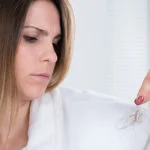PCOS test is based on the Rotterdam criteria for diagnosing PCOS.

Polycystic Ovarian Syndrome
“Within a year of getting affected by PCOS, I lost 1/4th of my hair on my head.”
“I have diffused thinning of my hair. The sides and the back of my head are where the thinning is worse.”
“I have developed a really wide parting, like you can see my scalp. And I worry that the situation is worsening.”
These are only a few comments about PCOS hair loss on a popular online forum, SoulCysters. While there are other, equally serious symptoms of PCOS, hair loss can be a nightmare for most women. As someone who has done a lot of reading on this subject, I want to tell you that there is hope. You can recover from PCOS hair loss once you understand the cause of it, and make the right changes to your diet and lifestyle.
In general, women lose hair due to a variety of other reasons. These reasons include certain drugs, anemia (primarily due to iron deficiency), a drop in estrogen levels, especially during menopause, and other illnesses and infections.
It isn’t abnormal to lose around 100-150 hair per day. This is a normal turnover process in which old hair fall off to be replaced by new, young hair. So it generally takes around 20-25% of scalp hair loss before the woman realizes that she is losing more hair than usual. Many women also suffer from hair loss shortly after giving birth. Normal hair loss pattern resumes 3-4 months later.
PCOS hair loss follows the pattern of hair loss as seen in males. Because the main cause of PCOS hair loss is an excess of male hormones in the body. This means you start losing hair around the frontal region of your scalp. It is therefore advisable to be aware of hair loss patterns while combing and washing.
Women with PCOS have excess amounts of the male hormone testosterone. Testosterone is converted to dihydrotestosterone (DHT). DHT is also made from a female hormone called DHEA. While women have DHT in small quantities, an excess of DHT clogs hair follicles and affects the normal process of hair growth.
Medical management of PCOS hair loss is very difficult. Drugs available for treating male pattern hair loss are successful in slowing hair loss and not reversing it. As a first step, your doctor will prescribe drugs to treat the overproduction of male hormones.
Some doctors may also advise a hair transplant for PCOS hair loss. While this does not address the root cause of the problem, it is an attractive option for young women who do not wish to wait for too long to reverse their PCOS hair loss. It is especially helpful in combating a receding hairline or hair loss on the top of the scalp.
Diet and lifestyle changes play a big role in dealing with PCOS. Even mainstream doctors consider diet and lifestyle changes as an essential first line of therapy for PCOS hair loss.
We are what we eat, literally and figuratively. Our diet is more closely linked with our wellbeing than we give it credit for. Eating a real meal that is cooked at home with fresh vegetables, whole grains, legumes, lean meats and high quality fats can work wonders for PCOS hair loss.
Eating and sleeping on a schedule might seem like a no-brainer for good health. But they have a deeper relationship with PCOS hair loss. Sleep is controlled by two hormones – melatonin and serotonin. A lack of sleep will cause an imbalance in the levels of these two hormones. This will, in turn, imbalance other hormones, including insulin. Regular eating will help in keeping your insulin levels normal.
In case you smoke, you need to kick this habit to reverse your PCOS hair loss. Apart from its many horrible health hazards, cigarette smoking also increases male hormone levels. And since PCOS hair loss is caused by excess male hormones, it makes sense to avoid things that increase their levels.
Excess weight is the reason behind insulin resistance, the key reason behind excess male hormones in women with PCOS. Physical exercises that help in weight loss can help in managing PCOS hair loss.
When you are stressed, your body responds by increasing levels of cortisol, the “stress hormone.” Cortisol worsens your hair loss. It can also increase your risks of more serious health complications like hypertension, increased weight, lowered bone density, weakened immune system and heart disease. Stress also increases the risk of insulin resistance.
In addition to diet and lifestyle changes recommended above, here are some hair care tips for managing PCOS hair loss.
PCOS hair loss is an emotionally draining issue with any women. If you have tried all of the above and are still losing hair, you should get your thyroid tested. There is a strong correlation between PCOS and hypothyroidism. And an under-performing thyroid is known to cause hair loss.
Finding out that you have PCOD after suffering from its symptoms can be distressing, but the good news is that the condition can be reversed naturally using a holistic approach with Sepalika’s 5-Petal PCOD Programme. Our personalised protocols help treat PCOD at the root through diet, nutrition, exercise, Ayurveda and magnet acutherapy. What’s more, expert consults via phone and WhatsApp help you always stay on track in your journey to overcome PCOD. Click here to know more.